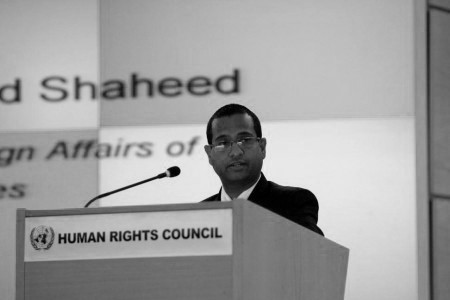UN experts call on Iran to stop intimidating journalists ahead of parliamentary elections

GENEVA (11 November 2015) – The authorities in Iran should stop arresting, prosecuting and harassing journalists and online activists, and provide a safe space for freedom of expression as the country prepares for parliamentary elections early next year, UN human rights experts said today.
“Increasing intimidation of journalists is hindering their ability to operate freely in the country,” said Ahmed Shaheed, UN Special Rapporteur on Iran. He noted that in recent days, Iranian intelligence and security officials have arrested a number of journalists in what appeared to be a new crackdown on freedom of expression and the media.
The arrest on 2 November of five journalists, including Afarine Chitsaz, Ehssan Mazandarani, Saman Safarzai, and Issa Saharkhiz, by plainclothes members of the Revolutionary Guard’s intelligence units was particularly worrying, Mr. Shaheed said.
The journalists were reportedly detained on suspicion of taking part in an infiltration network, seeking to influence public opinion and undermine the Islamic Republic on behalf of western governments, according to Iranian state television and media reports. More than a dozen other journalists and social media activists have also reportedly been summoned for interrogation by the authorities.
Iran has one of the highest numbers of journalists and social activists in detention in the world. According to figures from April 2015, at least 45 were being held for their peaceful activities.
“The government of Iran should not silence critical or dissenting voices under the guise of vague and unsubstantiated national security concerns,” Mr. Shaheed said. As a State party to the International Covenant on Civil and Political Rights, Iran has international obligations to allow and protect the right to a free press and access to information, he stressed.
“Freedom of expression is central to guarantee open, free and fair political processes. Ultimately, democratic processes are unsustainable if media workers and activists have no safety to perform their vital role,” said David Kaye, the Special Rapporteur on the right to freedom of opinion and expression.
The timing of an increase in detention and harassment of journalists was particularly worrying, Mr Kaye said, as the country prepares for parliamentary elections in February 2016.
“Public participation in any electoral process is virtually impossible if the media and civil society are so frequently affected by arrests and prosecution. Unfortunately this is not a new concern; similar concerns were expressed by UN experts regarding the arrest of journalists just before the Iranian elections of 2013” said Mr. Kaye.
The Iranian authorities should reverse this trend and must quickly ensure “a greater space for free exchange of ideas in the run-up to elections,” he added.
The human rights experts urged the Government of Iran to release all journalists including Jason Rezaian, who have been arbitrarily and unlawfully arrested for their peaceful exercise of fundamental rights.
The Special Rapporteurs are part of what is known as the Special Procedures of the Human Rights Council. Special Procedures, the largest body of independent experts in the UN Human Rights system, is the general name of the Council’s independent fact-finding and monitoring mechanisms that address either specific country situations or thematic issues in all parts of the world. Special Procedures’ experts work on a voluntary basis; they are not UN staff and do not receive a salary for their work. They are independent from any government or organization and serve in their individual capacity.

